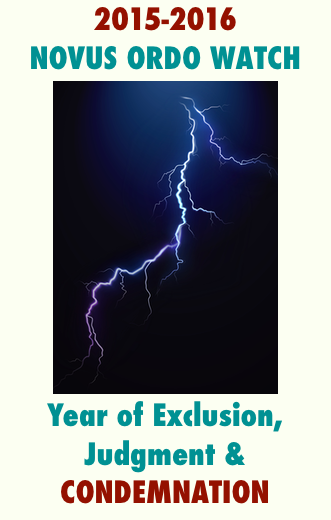 YEAR OF CONDEMNATION
YEAR OF CONDEMNATION
06: Scriptural Condemnations of Presumption and False Mercy
There is a lot of talk about “mercy” these days: “God never tires of forgiving,” the apostate Francis keeps repeating, and now, in the latest hysterical-heretical drivel spouted by the Antipope, we are told that confession of one’s sins is not necessary for a valid absolution — merely showing up and saying nothing now suffices: “If someone comes to you and feels something must be removed from him, but perhaps he is unable to say it, but you understand … it’s all right, he says it this way, with the gesture of coming. First condition. Second, he is repentant. If someone comes to you it is because he doesn’t want to fall into these situations, but he doesn’t dare say it, he is afraid to say it and then not be able to do it. But if he cannot do it, ad impossibila nemo tenetur. And the Lord understands these things, the language of gestures. Have open arms, to understand what is inside that heart that cannot be said or said this way … somewhat because of shame … you understand me. You must receive everyone with the language with which they can speak” (Antipope Francis, Address to ‘Missionaries of Mercy’, Feb. 11, 2016).
Against this nonsense, the Council of Trent taught dogmatically and infallibly: “If any one denieth, that, for the entire and perfect remission of sins, there are required three acts in the penitent, which are as it were the matter of the sacrament of Penance, to wit, contrition, confession, and satisfaction, which are called the three parts of penance; or saith that there are two parts only of penance, to wit, the terrors with which the conscience is smitten upon being convinced of sin, and the faith, generated (a) by the gospel, or by the absolution, whereby one believes that his sins are forgiven him through Christ; let him be anathema” (Trent, Session 14, Canon 4; underlining added).
Francis’ “mercy” is a false one, as we have documented on this web site aplenty.
The Catholic antidote to presumption (false mercy) on the one hand and despair on the other, is the virtue of hope: “O my God, relying on Thy almighty power and infinite mercy and promises, I hope to obtain pardon of my sins, the help of Thy grace, and life everlasting, through the merits of Jesus Christ, my Lord and Redeemer. Amen” (Act of Hope).
Catholics do not despair of their salvation, as though Christ’s mercy and grace were not capable of taking away their sins; nor do they presume on their salvation, as though their personal perseverance in God’s grace were absolutely guaranteed. Rather, Catholics hope for their salvation — with a “confident and unhesitating expectation, resting upon God’s most faithful promises, of eternal happiness to be obtained by the divinely appointed means” (A Catholic Dictionary, 3rd ed., s.v. “Hope, Act of”). This virtuous middle between the two extremes of despair and presumption is also taught, of course, in Holy Scripture, which is the reason why there are scriptural passages warning against either extreme. Since today there is much too great of an emphasis being placed on mercy, we will now consider some of the “other” passages, namely, those warning against overconfidence, presumption, and a false “mercy”:
“Say not: I have sinned, and what harm hath befallen me? for the most High is a patient rewarder. Be not without fear about sin forgiven, and add not sin upon sin: And say not: The mercy of the Lord is great, he will have mercy on the multitude of my sins. For mercy and wrath quickly come from him, and his wrath looketh upon sinners.” —Ecclesiasticus [Sirach] 5:4-7
“The fear of the Lord driveth out sin: For he that is without fear, cannot be justified: for the wrath of his high spirits is his ruin” —Ecclesiasticus [Sirach] 1:27-28
“O wicked presumption, whence camest thou to cover the earth with thy malice, and deceitfulness?” —Ecclesiasticus [Sirach] 37:3
“Blessed is the man that is always fearful: but he that is hardened in mind, shall fall into evil.” —Proverbs 28:14
“All these things have I considered in my heart, that I might carefully understand them: there are just men and wise men, and their works are in the hand of God: and yet man knoweth not whether he be worthy of love, or hatred…” —Ecclesiastes 9:1
“Thou wilt say then: The branches were broken off, that I might be grafted in. Well: because of unbelief they were broken off. But thou standest by faith: be not highminded, but fear. For if God hath not spared the natural branches, fear lest perhaps he also spare not thee. See then the goodness and the severity of God: towards them indeed that are fallen, the severity; but towards thee, the goodness of God, if thou abide in goodness, otherwise thou also shalt be cut off.” —Romans 11:19-22
“But to me it is a very small thing to be judged by you, or by man’s day; but neither do I judge my own self. For I am not conscious to myself of any thing, yet am I not hereby justified; but he that judgeth me, is the Lord.” —1 Corinthians 4:3-4
“But he that glorieth, let him glory in the Lord. For not he who commendeth himself, is approved, but he, whom God commendeth.” —2 Corinthians 10:17-18
“Wherefore, my dearly beloved, (as you have always obeyed, not as in my presence only, but much more now in my absence,) with fear and trembling work out your salvation.” —Philippians 2:12
“And if the just man shall scarcely be saved, where shall the ungodly and the sinner appear? Wherefore let them also that suffer according to the will of God, commend their souls in good deeds to the faithful Creator.” —1 Peter 4:18-19
(Source: Douay-Rheims Catholic Bible)



No Comments
Be the first to start a conversation